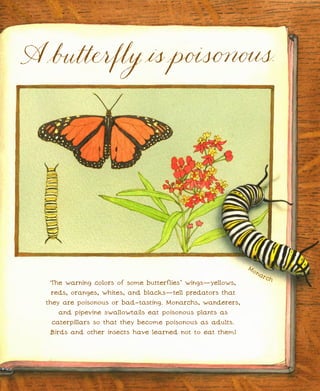Butterfly Is Patient
- 1. h rc a on M Ma l a y a L ce w i ng k ea tr rs i a H gs e pl eg r Pu at il Gre ta w ll o a Sw e in ev Pip ton Sylvia s As L on H u tt g a nn Gre Ba ia r en n D o
- 2. For my Sri Lankan friend and diviner of codes, Dilshan Madawala. —D. A. For my father—Frank J. Carlisle, Jr.—the blue-eyed sailor, who is my source for all things wise and wonderful. Among other things, he taught me the value of an interest in the natural world and our place in it. —S. L. yed S e-E a lu il o r B ACKNOWLEDGMENTS: Victoria Rock, editor, and Sara Gillingham, book designer, for their wisdom and dedication to quality in children’s books. Jeffrey S. Pippen, Nicholas School of the Environment, Duke University; Nicky Davis, Wild Utah Project, Butterflies and Moths; Linden Gledhill, photographer, Philadelphia, PA; Adrian Hoskins, LearnAboutButterflies.com, Hampshire, England; Teh Su Phin, Panang Butterfly Farm, Malaysia; Lizanne Whiteley, Conservation of Butterflies in South Africa; Robert N. Wiedenmann, Dept. of Entomology, University of Arkansas; Silvia Mecenero, South African Butterfly Conservation Assessment; Steve Woodhall, President, Lepidopterists’ Society of Africa; Jean-Claude Petit, Butterflies of Sangau National Park, Ecuador; Niklas Wahlberg, Dept. of Biology, University of Turku, Finland; Andr Victor Lucci Freitas, Universidade Estadual de Campinas, S o Paulo, Brazil; Museum Victoria’s Discovery Centre, Victoria, Australia; Gareth S. Welsh, Butterfly World, Stockton-on-Tees, England; Thomas Neubauer, ButterflyCorner.net, Germany; John J. Obrycki, Chair, Dept. of Entomology, University of Kentucky; Halmar Taschner, South African Nursery Assoc.; Melani Hugo, Butterfly Garden at Ludwig’s Rose Farm, Gauteng, South Africa; Tim Loh, British Columbia, Canada Text © 2011 by Dianna Aston. Illustrations © 2011 by Sylvia Long. All rights reserved. No part of this publication may be reproduced in any form without written permission from the publisher. Library of Congress Cataloging-in-Publication Data Aston, Dianna Hutts. A butterfly is patient / by Dianna Aston ; illustrated by Sylvia Long. p. cm. ISBN 978-0-8118-6479-4 1. Butterflies—Juvenile literature. I. Long, Sylvia. II. Title. QL544.2.A87 2011 595.78’9—dc22 2010008548 Book design by Sara Gillingham. Handlettered by Anne Robin and Sylvia Long. The illustrations in this book were rendered in watercolor. Manufactured by Toppan Leefung, Da Ling Shan Town, Dongguan, China, in December 2010 1 3 5 7 9 10 8 6 4 2 This product conforms to CPSIA 2008. Chronicle Books LLC 680 Second Street, San Francisco, California 94107 www.chroniclekids.com
- 3. y ll ar r i ti F d te ot Sp Sylvia Long on Ast t ts Hu a nn ia D
- 5. Gr ea Pu t rp le H airstreak It begins as an egg beneath an umbrella of leaves, protected from rain, hidden from creatures that might harm it . . . until the caterpillar inside chews free from its egg-casing, tiny, wingless, hungry to grow.
- 6. A caterpillar feeds on leaves, eating so much that it must molt, or shed its skin, many times. It can grow up to 30,000 times larger than it was AR when it took its first bite. YS DA ST 26 IN H R A 5T T S IN T S 1 AYS 15 D AY S 21 D PR EPUP A 3R D IN ST A R
- 7. uckeye o n B m om C YS A D 38 : S A Y P A U D P E 38 R U T A M : S Y A D PA 2 6 PU W E NE N WL Y EME RGED Once a caterpillar has eaten all that it needs, it creates a protective covering called a chrysalis. Curled inside the chrysalis, it is growing wings. Now it is time for metamorphosis, changing from one form to another.
- 8. ongw ing r a L Z eb Ea er st n Sw all ow Ti g er ta il
- 9. Butterflies, like bees, help pollinate plants so that they can reproduce, or make seeds. As a butterfly flits from flower to flower, sipping nectar, tiny grains of pollen cling to its body, then fall away onto other flowers. Seeds are only produced when pollen is transferred between flowers of the same species. This is called pollination.
- 10. O w l Pea coc Butterflies use their wings to protect k themselves from predators such as hungry birds, lizards, and other insects. Some butterflies have markings on their wings called eyespots. Scientists don’t know what they are used for—perhaps to scare away predators or attract mates!
- 11. Or an ge Oa kl e a f Wings can help butterflies camouflage, or hide, themselves in the environment. One kind of butterfly, the peacock butterfly, makes a hissing sound by rubbing its wings together when it is alar med.
- 12. il ta low al Sw ne vi pe Pi
- 13. M on ar ch The warning colors of some butterflies’ wings—yellows, reds, oranges, whites, and blacks—tell predators that they are poisonous or bad-tasting. Monarchs, wanderers, and pipevine swallowtails eat poisonous plants as caterpillars so that they become poisonous as adults. Birds and other insects have learned not to eat them!









































